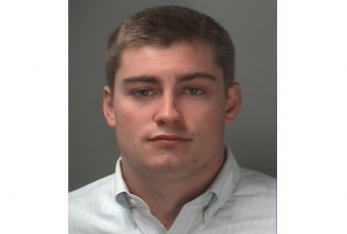 The prosecutors who agreed to a controversial plea deal for a former University of Indiana student accused of raping two women issued a statement this afternoon that explained the reasoning underlying the final disposition of the case.
The prosecutors who agreed to a controversial plea deal for a former University of Indiana student accused of raping two women issued a statement this afternoon that explained the reasoning underlying the final disposition of the case.
Former IU student John Enochs was accused of raping a woman at a fraternity house in 2015. During the investigation into that incident, investigators discovered another alleged victim from a 2013 incident who also accused Enochs of attacking her. He was eventually arrested and charged with two rapes, however, last Thursday prosecutors dismissed both rape charges after Enochs pleaded guilty to a misdemeanor battery charge. He was sentenced to one-year probation.
The Monroe County Prosecutor’s Office on Monday issued a statement explaining the decision was made because the “case presented a very unusual set of circumstances” of “two unrelated accusations, two years apart.” Furthermore, the statement explained that after the arrest “evidence continued to be developed that lead us to the conclusion that neither case, standing alone, presented sufficient evidence to prove rape.” The prosecutors also explained that jurors hearing one case would not be able to hear allegations related to the other case.
The statement then addressed each incident individually and the problems they encountered as they investigated each incident.
In the 2013 case, the alleged victim “had no specific recollection of the events” and the length of time since the alleged incident as well as alcohol consumption “severely hindered the investigation.” Investigators also found photographs taken just before the alleged incident occurred “contradicted” the alleged victims’ claims that she was “incapable of engaging in consensual activity.”
“This is important because the complaint was that she was ‘unaware’ that the sex was occurring due to her consumption of alcohol. Indiana law has a provision in the rape statute that makes this charge available to prosecutors,” the statement reads.
In the 2015 case, prosecutors also “had similar evidentiary problems” including “video evidence” of the alleged victim “before and after the alleged assault” that do not support the claims of “forcible rape.” Additionally, the statement noted “problematic DNA evidence” which “made it impossible for us to prove that the defendant was the cause of [the accuser’s] injury.”
The statement concluded by expressing “frustration” at how the case unfolded and said the decision to enter the plea “as a misdemeanor was within the Court’s discretion.”
Read the Monroe County Prosecutor’s Office statement, in full:
This case presented a very unusual set of circumstances in that we had two unrelated accusations, two years apart. That was an important consideration in our initial decision to charge. However, under the law, a jury considering one case would not be allowed to know about the other. After the case(s) was filed, evidence continued to be developed that lead us to the conclusion that neither case, standing alone, presented sufficient evidence to prove rape.
In the older case, the complaining witness had no specific recollection of the events; the few witnesses could not recall important details due to the passage of time and the consumption of alcohol; and the complaining witness’s decision to prosecute came two years after the event which severely hindered the investigation. There were also photographs that contradicted the assertion that the complaining witness was incapable of engaging in consensual activity shortly before the alleged assault. This is important because the complaint was that she was “unaware” that the sex was occurring due to her consumption of alcohol. Indiana law has a provision in the rape statute that makes this charge available to prosecutors.
The more recent case had similar evidentiary problems. In that case there is video evidence of activities of the complaining witness, before and after the alleged assault, which does not support the assertion of a forcible rape, which was the charge in this instance. There is also DNA evidence that is problematic, and made it impossible for us to prove that the defendant was the cause of her injury.
This turn of events was frustrating for us as prosecutors, due to the fact that there were two complaints against the defendant. That fact is the reason we continued to pursue accountability on his part which led to this plea agreement. It should be noted that he entered a plea of guilty to Battery as a Level 6 Felony. The decision to enter it as a misdemeanor was within the Court’s discretion.
As my colleague Ronn Blitzer wrote earlier on Monday, Enochs attorney, Katharine Liell has said her client was charged with crimes he did not commit and accused the lead investigator of misconduct in presenting the probable cause affidavit.